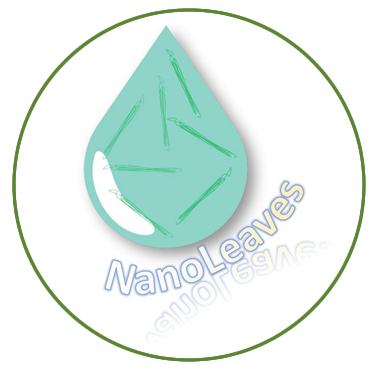
NanoLeaves Lab is a group of synthetic chemists settled at the Department of Chemistry and Industrial Chemistry of the University of Pisa. The research activity fits in the fields of Organic Chemistry and Materials Science. At NanoLeaves Lab, we develop new materials and explore their new and exciting applications in the fields of Chemistry, Technology, and Optoelectronics. We are interested in the preparation and functionalization of organic materials including biomaterials from natural sources, with an eye to nanocellulose and cellulose nanocrystals and to other biopolymers.
LATEST BLOG POST
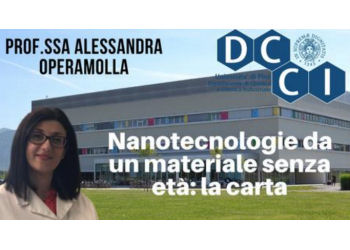 Last May 5th Alessandra Operamolla, from the NanoLeaves Group, gave a lecture to high school students entitled “Nanotechnology from an ageless material: paper”. The lecture is available on the YouTube channel of the Department of Chemistry and Industrial Chemistry (DCCI) since it is part of the cycle DCCI Talks.
Last May 5th Alessandra Operamolla, from the NanoLeaves Group, gave a lecture to high school students entitled “Nanotechnology from an ageless material: paper”. The lecture is available on the YouTube channel of the Department of Chemistry and Industrial Chemistry (DCCI) since it is part of the cycle DCCI Talks.
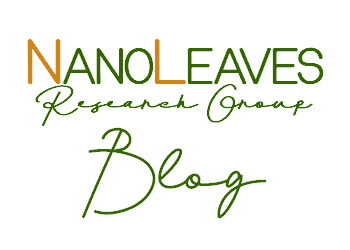 A new work from the NanoLeaves Lab in collaboration with colleagues from the University of Rome Tor Vergata, from ENEA – Italian National Agency for New Technologies, Energy and Sustainable Economic Development and from the University of Rome La Sapienza, focuses on the use of sustainable CNCs in paper conservation. The proposed approach is benign for the health of restorers, as CNCs are non-toxic and they are dispensed from water. CNCs are transparent, mechanically and thermally stable, and act as a protective treatment for paper fibers.
A new work from the NanoLeaves Lab in collaboration with colleagues from the University of Rome Tor Vergata, from ENEA – Italian National Agency for New Technologies, Energy and Sustainable Economic Development and from the University of Rome La Sapienza, focuses on the use of sustainable CNCs in paper conservation. The proposed approach is benign for the health of restorers, as CNCs are non-toxic and they are dispensed from water. CNCs are transparent, mechanically and thermally stable, and act as a protective treatment for paper fibers.
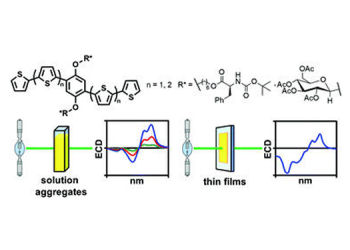 During these first months of 2021 I have published two papers concerning my previous research activities started at the University of Bari Aldo Moro. Among my specializations, I am expert in the synthesis and characterization of conjugated materials based on arylenethienylene structures. The first of these studies describes the preparation and characterization of diketopyrrolopyrrole (DPP) and thiophene -based oligomers, decorated with -SAc groups. This work is the natural evolution of my PhD thesis, that was centered on the preparation of thiol oligoarylenes for molecular electronics.
During these first months of 2021 I have published two papers concerning my previous research activities started at the University of Bari Aldo Moro. Among my specializations, I am expert in the synthesis and characterization of conjugated materials based on arylenethienylene structures. The first of these studies describes the preparation and characterization of diketopyrrolopyrrole (DPP) and thiophene -based oligomers, decorated with -SAc groups. This work is the natural evolution of my PhD thesis, that was centered on the preparation of thiol oligoarylenes for molecular electronics.
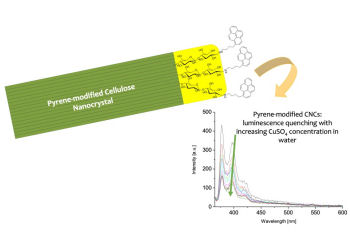 The reductive amination reaction is an interesting tool to achieve one terminus functionalization of cellulose nanocrystals. Since at NanoLeaves laboratory we are interested in novel applications of CNCs, we have used pyrene luminescence to understand if the new functionality introduced on CNCs may interact preferentially with some metal cations. In our work we compare the behavior of reductively aminated CNCs deriving from sulfuric acid hydrolysis or hydrochloric acid hydrolysis (that we named neutral CNC, N_CNC). Pyrene luminescence in water is used as a probe to understand if some selective or preferential interaction with metal cation achieves involving the pyrene portion of the nanocrystals.
The reductive amination reaction is an interesting tool to achieve one terminus functionalization of cellulose nanocrystals. Since at NanoLeaves laboratory we are interested in novel applications of CNCs, we have used pyrene luminescence to understand if the new functionality introduced on CNCs may interact preferentially with some metal cations. In our work we compare the behavior of reductively aminated CNCs deriving from sulfuric acid hydrolysis or hydrochloric acid hydrolysis (that we named neutral CNC, N_CNC). Pyrene luminescence in water is used as a probe to understand if some selective or preferential interaction with metal cation achieves involving the pyrene portion of the nanocrystals.
NANOLEAVES - Research Group at the Department of Chemistry of the University of Pisa
Via Giuseppe Moruzzi, 13 - 56124 Pisa, Italy
Admin LogIn/LogOut | Privacy Policy![]()



